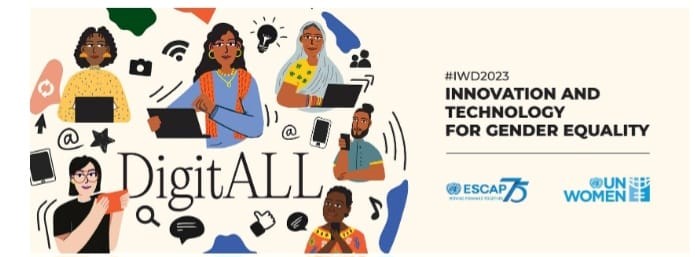
Photo: Courtesy
Karatina University concluded the annual globally-celebrated International Women’s Day with a clarion call to bridge gender gaps in all spheres of life. Under the Theme ‘DigitALL: Innovation and Technology for Gender Equality’, the internationally-attended virtual celebrations organized by the University’s International Women’s Day Committee, chaired by Prof. Juliet Macharia, was held on Wednesday, 8th March 2023.
Make Digital Space Inclusive and Equitable
In his welcoming remarks, the Vice Chancellor, Prof. Mucai Muchiri, who was represented by the Deputy Vice Chancellor (Academic, Research and Students Affairs), Prof. Peninah Aloo-Obudho, stated that empowering women with digital technology skills will give them equal opportunities to pursue and thrive in STEM careers hence narrowing the gender gap. This would also enhance their economic security, ensure a diverse and talented STEM workforce and prevent biases in these fields. This assertion comes at the backdrop of a UN Women Report that stated that persistent gender gap in digital access has kept women from unlocking technology’s full potential. Their underrepresentation in STEM education and careers remain a major barrier to their participation in technology design and governance.
The Vice Chancellor applauded the Government of Kenya’s initiative to develop the National Digital Master Plan which is intended to guide the country’s quest to become a digital economy. In this Plan, the Government envisages to train over one million people on digital technology. He called upon the participants present to encourage women and girls within their circles to take advantage of these Government initiatives. The Vice Chancellor also challenged universities in Africa to play their rightful role in training women on digital technology so as to create a critical mass of skilled labour to support the digital economy. This would, he said, make the digital space more inclusive and equitable, significantly narrow the gender gap and create a better future not only for women and girls but for all humanity.
Innovation and Technology for the Protection and Empowerment of Women
The Chief Guest, Amb. (Dr) Monicah Juma, the National Security Advisor to the President of the Republic of Kenya spoke on ‘Leveraging Innovation and Technology for the Protection and Empowerment of Women.’ She echoed that the Day proffers strategies on how to enhance gender equality in general and women empowerment in particular.
“It is a day when all humanity under the aegis of the United Nations celebrate and re-affirm their stand on social justice and equality for a better society.”

Ambassador (Dr.) Monica Juma
Amb. Monica Juma stated that, across the world, there are still injustices and inequalities but that it was more pronounced in Africa. Situations of scarcity, stress and underdevelopment characterized by limited resources and lack of empowerment have led to the inability to access and enjoy full rights. The COVID-19 pandemic, whose effects were largely experienced by women and girls as majority caregivers, providers and frontline workers, played a role in increasing the gender gap as the country witnessed an increase in early pregnancies during and after the pandemic period. The effect of economic slowdown and shut down also made many women, especially in the informal sector, to lose their small businesses and survival mechanics. The raging war in Europe has triggered logistics and supply chain crisis, thus, triggering an increase in inflation that has hit the whole world but largely the marginalized people. Climate crisis has put the society in dire straits but more specifically on women because they bear the brunt for this burden. In Africa, there is continued diminishing food security and survival of livelihoods of women. Such effects, she alluded, would have a definite impact to the future.
What is needed?
Amb. Juma stated that as a result of all these challenges, gender discussions must focus on equality, productivity, security and destiny issues. All humanity is born equal and the Constitution of Kenya provides for the full realization of each person’s potential. On productivity, evidence across board shows that any sector, company or enterprise that employs and deploys women performs better. It is also a security issue because security forces develop better mission readiness and execution, have better sensibility and secure societies better when women are involved. Finally, it is a destiny issue because a society that has put women in their rightful positions have better societies and quality of life.
She articulated that innovation and technology are levers that can be used to safeguard gains made in order to accelerate gender empowerment.
“Technology is a decisive factor in the systematic competition between democracies and non-democracies, between human success and failure. In the uptake of technology, it is critical to check on how women can access the digital world. The services should be made easy to access and also campaign for an enabling framework and policies.’
There are a number of normative frameworks put in place to affirm gender equality and empowerment. In Africa, there is the Maputo Protocol, the African Charter on Human and Peoples Rights, Agenda 2063, the Sustainable Development Goals (SDGs) and the East African Community Treaty which enhances the role of women. At the national level, there is the Constitution 2010 which creates a platform for gender equality and non-discrimination and Vision 2030 which emphasizes the need for women economic empowerment among others.
‘Despite all these elaborate normative frameworks, we are still hindered by history, patriarchy, cultural beliefs and material circumstance of poverty. Therefore, fighting for women’s rights becomes a global endeavor.’
Empowering women ensures they are not easily bullied. This can be in terms of availing education to them where there is exposure to Science, Technology, Engineering and Mathematics (STEM) fields and an opportunity to participate in innovation. Bridging the financial inclusion gap also empowers women economically which, in effect, enables them to provide balanced diet to their families and education for their children.
‘Women should also be provided with data for planning at institutions and government level. This allows them to have right targeting, correct planning, right questioning when making policy decisions and monitor the impact of the services at the individual and national level.’
Amb. Juma emphatically noted that young youth and women need to be mentored and encouraged across sectors. This can be realized by educating women innovators and programmers on matters patenting and intellectual protection rights so that their ideas are not stolen or reproduced. There should also be zero tolerance on women harassment and abuse.
“The digital environment provides women space to be educated, mentored and empowered but it should not be viewed as a women versus men competition. Innovation and technology need to be driven with the aim of achieving diversity. This will help in ensuring that no one is left behind and lead to poverty reduction, thus, achieving a fruitful society,” she concluded.